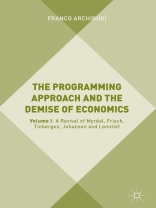In this book – the first of three volumes – Franco Archibugi sets out to create an epistemology of economics, arguing for a radical overturning of the conventional analysis from a “positive” approach to a “programming” approach. This overturning leads to a reappraisal of the foundations of Economics itself, and to an improved integration of Economics as an autonomous discipline alongside Sociology, Political Science, Operational Research, Social Engineering and Physical or Spatial Planning.
The author interrogates how scientific the social sciences really are before proposing a new scientific paradigm for the social sciences, a political preference function and a general programming approach. The chapters revisit hitherto neglected economists like Gunnar Myrdal, Ragnar Frisch, Vassili Leontief, and Leif Johansen, using their theory to overturn the epistemological approach of the entire science of economics.
Volume II explores oppositions to the traditional and conventional teaching of economics, whilst Volume III presents a concrete and practical example of how to build a Planning Accounting Framework (PAF), as associated with Frisch’s ‘plan-frame’ (explored in Volume II), to demonstrate the extent to which decisions and negotiations can be routed in the social sciences.
Tabla de materias
1. How scientific are the social sciences?.- 2. Toward a new scientific paradigm for the social science: according Myrdal.- 3. Planning and planning theory: the difficult legacy of Ragnar Frisch.- 4. Basic requirements for the Programming approach.- 5. The ‘Programming approach’.- 6. The political preference function.- 7. The impact of the programming approach on socio-economic modelling.- 8. The World-Wide Vision and the ‘Central Planning’ Vision: Methodology for the Implementation of the ‘Programming Approach’ (The Great Jan Tinbergen’s Role’ ).- 9. The Pitfalls of Implicit Theorising and the Abuse of Indirect Statistical Inference: Leontief ’s Criticism (of Robinson, Kahn, Hicks, Keynes and Many Other Authors, Based on Implicit Theorising).
Sobre el autor
Professor Franco Archibugi is the Founder and Chairman of the Planning Studies Centre in
Rome, Italy. Prior to this he taught economics at the University of Florence, Italy and planning
at the Universities of Calabria, Palermo, and Naples, Italy. He studied history and philosophy at
the Universities of Rome and Heidelberg, and economics at the London School of Economics.
He is the author of many books and papers on socio-economic, environmental and urbanplanning published in Italian, English and other languages.












